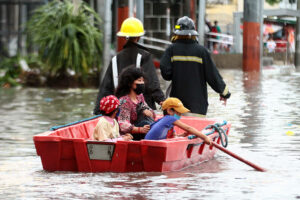
Human Settlements dep’t issues challenge to private sector to build resilient communities
THE Human Settlements department has invited the private sector to collaborate with the government in building communities that are resilient in the face of climate change and natural disasters.
Undersecretary Henry L. Yap of the Department of Human Settlements and Urban Development (DHSUD), in a keynote speech at a forum organized by BusinessWorld, said “all stakeholders” need to work to create resilient communities.
“To achieve our goal, we need a united front. The realization of an inclusive, resilient, and sustainable human settlements entails coordination and support from all stakeholders, as well as significant funding and investment,” Mr. Yap said at the BusinessWorld Insights Forum, “Building Sustainable and Inclusive Communities for the Future” in Makati City on Wednesday.
“We are inviting the private sector partners, business people and leaders, development partners, and our local government units to partner with us in building a better Philippines,” he added.
Urban planner and Palafox Architecture Group, Inc. President Felino A. Palafox, Jr. said the Philippines needs to have 100 new “sustainable, resilient, and smarter” cities by 2050 to house a population projected to grow to over 150 million.
“By 2050, it is forecast that the Philippines will be the 16th largest economy in the world. There will be 150 million Filipinos by 2050, of which 70% will be urban population. We need 100 new cities by 2050. Otherwise, our existing cities will be as bad, if not worse, than Metro Manila today,” he said.
“We need strong political will with visionary leadership, urban design, and excellent management,” he added.
Ramon Rivero, Robinsons Land Corp. head of corporate planning, strategy, and sustainability, said that sustainable real estate development is an imperative rather than an option.
“Our cities are expanding at a fast rate and with this growth comes the need for more housing, commercial space, and infrastructure. However, this growth must not come at the expense of our environment,” Mr. Rivero said.
“We have to make sustainability very easy for our people, be it in the form of incentives or form of education. It has to be an easy option. You have to design it in a way that is easy and accessible for them to implement,” he added.
TruNorth Homes Founder and Chief Executive Officer Earl Forlales said that sustainable infrastructure and solutions should be more accessible to promote broader adoption by consumers.
“There is no use for a well-planned sustainable community if people cannot afford to live in it. If we’re able to infuse sustainable features and still make it affordable, that would make a sustainable community,” he said.
“Sustainable infrastructure has to be affordable to the regular consumer. The more that we can make sustainable solutions more affordable, behavioral change will naturally follow on the consumer level without forcing it,” he added.
Yvonne Flores, Gokongwei Group head of sustainability and corporate social responsibility, said inclusive urban planning should be approached systemically.
“It is looking at the overall system and implementing solutions systemically,” she said.
“Resilience is an existential must for all of us. We must make sure that the vulnerable within our communities are included in the solutions we’re looking at. It’s about looking those who are vulnerable and ensuring that because we are part of the community, even the vulnerable are protected and included in the solutions that we are looking at,” she added.
Aboitiz Infracapital Economic Estates Vice-President Jolan Formalejo said that committing to sustainable urban development should be the guiding principle in planning inclusive communities.
“With this comes making sure that inclusivity is integrated. The solution is to decongest these cities by providing new regional areas,” he said.
“Once we start in the regions, we have the full opportunity to make a difference,” he added.
BusinessWorld Executive-Vice President Lucien C. Dy Tioco said sustainable cities and communities remain a challenge for the Philippines.
“In an era marked by rapid urbanization and unprecedented global challenges, the need to make our cities and communities inclusive, sustainable, and resilient has never been more critical,” he said.
“Even the effects of recent Typhoon Carina and the southwest monsoon in Metro Manila and Luzon alarm us once again of how crucial it is to make our communities not just ready for disasters but capable of mitigating their impacts to avoid casualties,” he added. — Revin Mikhael D. Ochave



